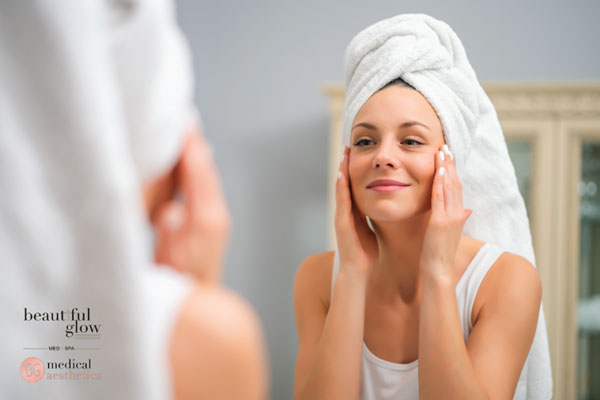
Skin Barrier
Your skin is made up of layers, each of which performs important functions in protecting your body. The outermost layer, called the stratum corneum, is often described as a brick wall. It consists of tough skin cells called corneocytes that are bound together by mortar-like lipids. This is your skin barrier.
Inside the skin cells, or “bricks”, you’ll find keratin and natural moisturizers. The lipid layer contains:
- Cholesterol
- Fatty Acids
- Ceramides
This fantastically thin brick wall is literally keeping you alive. Without it, various harmful environmental toxins and pathogens could penetrate your skin and cause adverse effects inside your body. Additionally,, without your skin barrier, the water inside your body would escape and evaporate, leaving you completely dehydrated.
Your skin barrier is essential for your overall health and needs to be protected to help your body function properly.
What can damage your skin barrier?
Your skin defends against a barrage of threats daily, many of which come from outside your body and a few come from within.
Some of the external and internal factors that can affect your skin barrier include:
- Too humid or too dry environment
- Allergens, irritants, and pollutants
- Too much sun exposure
- Alkaline detergents and soaps
- Exposure to harsh chemicals
- Over-exfoliation or over-washing
- Steroids
- Psychological stress
- Genetic factors that may make you more prone to certain skin conditions like atopic dermatitis and psoriasis

How can you tell if your skin barrier is damaged?
When your skin barrier is not functioning properly, you may be more prone to developing the following skin symptoms and conditions:
- Dry, scaly skin
- Itchiness
- Rough or discolored patches
- Acne
- Sensitive or inflamed areas
- Bacterial, viral, or fungal skin infections
How to protect and restore your skin barrier
- Simplify your skin care routine:
- Complicated daily skin regimen involving a basketful of product may inadvertently weaken your skin barrier. Those with sensitive skin and darker skin tones may want to use a soft cloth and a mild chemical exfoliant. Some types of scrubs and brushes may temporarily damage your skin barrier.
- Pay attention to pH:
- Your skin’s delicate acid mantle hovers around a pH of 4.7, but the pH of some skin products can range from 3.7 to 8.2. Keeping your skin’s pH at a healthy level may help protect you from skin conditions like dermatitis, ichthyosis, acne, and Candida albicans infection.
- Try a plant oil to replenish your skin barrier:
- Many of these oils have antibacterial, anti-inflammatory, and antioxidant effects. Some of the most effective plant oils to consider using on your skin include:
- Jojoba Oil
- Coconut Oil
- Almond Oil
- Argan Oil
- Borage Oil
- Rosehip Oil
- Sunflower Oil
- Soybean Oil
- Primrose Oil
- Black Currant Oil
- You can apply creams and lotions that contain one or more of these oils as an ingredient. Or you can pour a small amount of the oil into the palm of your hand and then massage it gently into your skin until it is absorbed.
- Many of these oils have antibacterial, anti-inflammatory, and antioxidant effects. Some of the most effective plant oils to consider using on your skin include:
- Look for formulations that include ceramides:
- Ceramides are waxy lipids found in especially high concentrations in the stratum corneum. They are crucial for making sure your skin barrier functions properly. Ceramide moisturizers may be especially helpful if you have acne.
- Try moisturizers containing hyaluronic acid, petrolatum, or glycerin:
- Dry skin is a common problem and moisturizers are the often-recommended solution. An occlusive moisturizer aids the skin barrier by reducing the amount of water loss from your skin. These products leave a thin film on your skin that helps prevent moisture loss.
